MAY DAY JAMES MAY ON CAR STUNTS, PLAYING THE FOOL AND THE GRAND TOUR’S RETURN P17
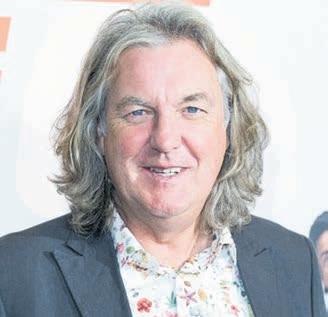


THE CBI, Britain’s decades-old business body, will find out if it has a future today after members vote on the group’s response to a string of sexual misconduct allegations.
Members of the body are set to cast ballots at an extraordinary general meeting this afternoon at the outfit’s Cannon Street headquarters. They will opine on the organisation’s ‘role and purpose’ in what is effectively a no-confidence vote in the CBI’s new leadership.
It comes after a wave of allegations mired the top business lobby group in scandal, with claims of sexual harassment, workplace misconduct and rape damaging its reputation. Many of the claims are so far unsubstantiated.
Former director-general Tony Danker was dismissed after claims of misconduct –unrelated to sexual abuse –were made against him, while the government and Labour cancelled their
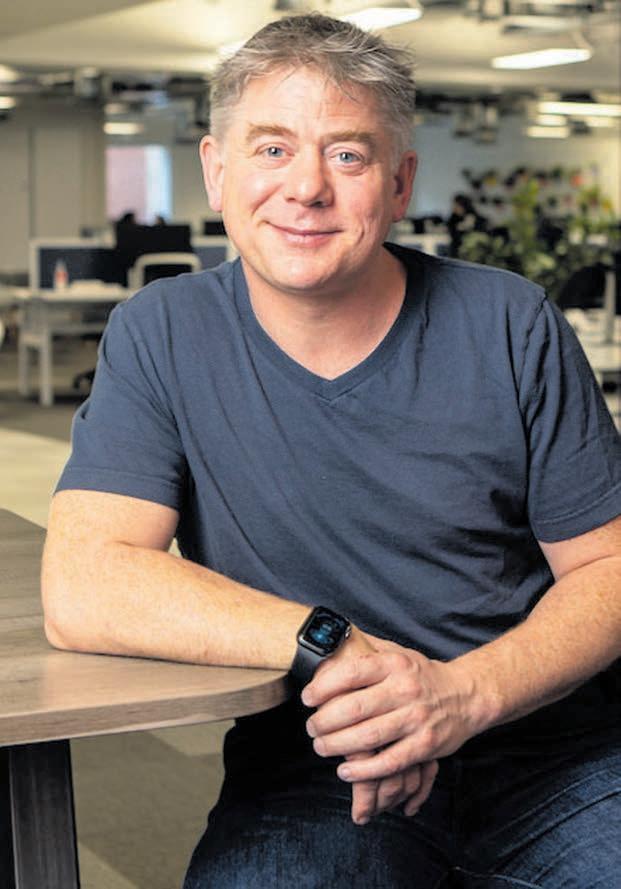
MOYES MAGIC HAMMERS BOSS IS RIGHT MAN FOR REVIVAL P19

engagement with the body. Around a quarter of the organisation’s members either terminated or suspended their membership.

It is believed that the results of the ballot will not be released in full, with no detail on how members voted. The meeting will last around 90 minutes, from midday, with a verdict expected mid-afternoon.
The CBI last week published an outline of how their culture and processes would change, though pushed back against allegations of a ‘toxic’ or ‘misogynistic’ culture.
The president of the body Brian McBride mounted a robust defence of the organisation yesterday, writing in the Financial Times that the body’s “position has been put in jeopardy.”
But he insisted the CBI had listened; increased accountability structures; worked with business ethics consultancy Principia; and was en route to implementing 34 recommendations from the legal firm Fox Williams,
which investigated the claims. Urging members to back the leadership’s plan, he wrote: “Succeed and we can make a leaner, more accountable and inclusive organisation. Fail and we lose precious time to fight for our members.”
Regardless of the vote, the pull-out of a host of large fee-paying members is likely to trigger redundancies. Yesterday a spokesperson for the nascent lobbying organisation BizUK said the CBI “is not able to carry out the role that its members have signed up for.
“That relationship [with government] is in the deep freeze and the idea that the package set to be voted on Tuesday will change anything overnight is wishful thinking.”
Last week No 10 sources told City A.M. the body’s package did not look “bold” enough for the government to re-open engagement with the CBI, but said all options were on the table if members demonstrated confidence.
EXCLUSIVE NICHOLAS EARL
ONE of the country’s most environmentally-minded energy bosses has said Just Stop Oil protestors cannot ask people “to make massive sacrifices” unless renewable energy replacements are on stream.
Greg Jackson, the boss of the country’s third largest energy firm Octopus, told City A.M. “we need to
escape from fossil fuels over time, and we’ve got to accelerate that move.
“If we’re going to ask society to stop using fossil fuels, we have to make the change an upgrade for people,” he added in an interview.
Just Stop Oil, who are calling for an almost immediate stop to the use of fossil fuels, are disrupting transport and major sporting events in a bid to draw attention to their calls.
£ INTERVIEW: PAGE 2
BEN LUCAS
ONE of the largest high court claims in UK history is set to restart next week as the trial commences in Privatbank’s $1.9bn (£1.54bn) fraud lawsuit against its former owners.
Ukrainian lender Privatbank is suing the bank’s founders Igor Kolomoisky and Gennadiy
Bogolyubov over allegations they embezzled billions of dollars from the bank through fraudulent loans to companies that were ultimately controlled by them. The pair deny the allegations.
The bank, nationalised in 2016, is seeking $1.9bn plus interest, which could run into the billions.
The lawsuit was filed in the

London High Court back in December 2017, and was able to be heard in the UK as some of the companies allegedly involved in misappropriating funds are UK corporate entities.
The case was set to go to trial in June last year, but a high court judge decided it should be postponed by a year after Kolomoisky and
Bogolyubov argued it would be unfair to force them to fight the claim following Russia’s invasion of Ukraine.
The trial is now set to take place on 12 June and is scheduled to run for 15 weeks. However, neither Kolomoisky or Bogolyubov will be giving evidence during the trial.
Richard Lewis, a Hogan Lovells
partner representing the bank, said: “The bank has throughout had confidence in the strength of its claims and that it will succeed in proving that it was the victim of fraud on a massive scale.”
Kolomoisky’s lawyer denied any wrongdoing. Bogolyubov’s lawyers did not respond to a request for comment.
CAN’T JUST STOP OIL Energy boss questions protesters’ logic
Like hardy garden perennials, politicians have topics they can safely return to again and again –particularly helpful if you have nothing overly new to say. One such is the thorny subject of skills. We have, for years now, been promised some version of a revolution in the way we develop ‘skills’ in the economy; a most cursory search of the government’s website reveals not just a skills minister and a “skills taskforce for global
Britain” but the Skills for Life campaign, the Skills Bootcamp programme and the National Careers Service’s Skills Assessment. The safest way to receive an applause line from a business-focused audience, as a politician, is to promise to upskill

Britain. A column by the former political adviser and economist Sam Dumitriu, however, should perhaps have us muting our applause. He argues that it isn’t skills holding Britain’s productivity back, even if (obviously) nobody is objecting to a more skilled workforce. Instead, he argues, it is our inability to build stuff. Exhibit A in his case is the impact assessment for the Lower Thames Crossing, a mooted tunnel under the river between
Essex and Kent. It ran, extraordinarily, to 93,000 pages. No wonder the thing hasn’t materialised yet. What makes the thought so interesting is that it puts the onus on politicians, not on employers, to get on with it. For years now parliamentarians have criticised businesses for relying on immigration to fill vacancies, slammed them for not sufficiently investing in training and barracked them for not playing their part in fixing the

the British Normandy Memorial ahead of the 79th anniversary of the landings
productivity puzzle. Yet if Dumitriu is right, it is politicians not businesses which are the problem. Even free market, libertarian newspapers like ours want governments to sign off on infrastructure projects. Politicians at local and national level have the power, with the flick of a pen, to sign off on genuinely transformative projects. They choose, for electoral reasons, not to. Worth a thought next time we hear about the skills revolution.
THE GUARDIAN
SEC SUES BINANCE AND CEO
ZHAO FOR ‘MISHANDLING BILLIONS OF DOLLARS’ Binance, the world’s largest cryptocurrency exchange, and its chief executive Changpeng Zhao are being sued by the US’s top financial watchdog, which has accused them of making billions of dollars while “placing investors’ assets at significant risk”.
THE FINANCIAL TIMES AI RISKS ‘SUBSTANTIAL DISRUPTIONS’ FOR JOBS, WARNS IMF OFFICIAL
Gita Gopinath of the IMF has warned of the risk of “substantial disruptions in labour markets” stemming from generative artificial intelligence, as she called on policymakers to quickly craft rules to govern the new technology.
Former president Donald Trump on Monday suggested he will soon face criminal charges in the long-running federal probe into his alleged unlawful retention of national defence information at his Florida property.
NICHOLAS EARL
”We need to keep building renewables - and make them better for people,” says Greg Jackson, the boss of Octopus. It is a simple statement but it gets to the heart of the UK’s energy dilemma. How to go green, but affordably.
The government has ambitious targets for boosting renewable generation in its energy security strategy, unveiled last year after Russia’s invasion of Ukraine – with a growing focus on domestic supplies.
This includes 50GW for offshore wind by 2030, 70GW of solar power by
2035 and 24GW of nuclear power by 2050.
However, it includes no targets for onshore wind – which remains in a defacto moratorium where even minority objections can extinguish projects.
Just two new turbines last year were hooked to the grid in England – fewer than in war-torn Ukraine.
Jackson argued the polling shows onshore wind is “crazily popular” – with support of over 80 per cent in polling when people are told it will help bring down energy bills.

He said: “I think it’s a crying shame that for example, in Germany, they
could build five liquid natural gas terminals last year, which is great. But in Britain, we can’t even build onshore wind farms. If we can put onshore wind farms where people want them and connect them to local communities, we could bring the cost of power down in months, whilst being renewable.”
“If I were in a runup to an election, I think I’d probably allow it where people
want it,” he added, referencing next year’s general election.
Octopus has been working with communities through its ‘Windr’ programme to connect prowind turbine communities with their projects.
Jackson also praised the latest developments around the UK’s energy grid, with the country’s electricity system operator announcing plans to allow developers to make their
own connections to the grid.
This follows his previous calls for third parties to be allowed to operate on the grid, amid the long waiting times in queues for new energy projects – with developers sometimes waiting over a decade to hook projects up to the grid.
“In the same way that monopolies held back the internet and the UK for so long and held back fibre, what we need is competition at every level of the grid,” Jackson says.
“Without competition, it’s hard to see how we can make the overhaul to the system that we need.”
BRITISH AIRWAYS (BA), the BBC and Boots said their staff were amongst those hit by a cyber attack on Zellis, a payroll provider used by hundreds of companies in the UK.
British Airways, owned by group IAG, said it had notified affected employees and was providing them with support.
In an email to employees, the BBC said data stolen included staff ID numbers, dates of birth, home addresses and national insurance numbers.
Part of the Walgreens Boots Alliance, Boots said the attack had included some of its employees’ personal details: “Our provider assured us that immediate steps were taken to disable the server,” Boots said.
The BBC has 20,000 staff. Boots em-
ploys over 50,000 people in Britain, while BA has about 30,000 staff.
US security researchers warned on Thursday hackers had stolen data from the systems of a number of users of file transfer tool Moveit Transferone one day after the maker of the software disclosed that a security flaw had been discovered.
Brookfield hired bankers at Barclays, Bank of America and Eastdil to manage the sale
SPIRITS giant Diageo has brought forward the appointment of its first female chief executive following the retirement of long-term boss Sir Ivan Menezes (pictured), who is now in hospital.

Debra Crew was appointed interim CEO yesterday, as Menezes is now undergoing emergency surgery before retiring at the end of June.
Crew was already due to take over as boss of the firm from 1 July.
The BBC warned staff their personal data could have been stolen

The compromised data includes names, addresses and national insurance numbers, said the Daily Telegraph newspaper, which first reported which companies had been affected by the breach.

The National Cyber Security Centre said it was monitoring the situation and urged organisations using Moveit to carry out security updates.
LAURA MCGUIRE
PRIVATE equity firm CVC Capital is reportedly drawing up an offer to buy Center Parcs after its owner, Brookfield, put the chain up for sale last month.
Rival French firm Antin is also mulling a potential offer.
CVC, Antin and Brookfield didn’t immediately respond to requests for

LAURA MCGUIRE
ASOS‘s share price jumped seven per cent yesterday after a report emerged on Sunday that the struggling retail chain received a £1bn takeover bid from a Turkish retailer backed by Chinese e-commerce giant Alibaba. Trendyol, an up-and-coming fast fashion retailer, was understood to have approached Asos in late
December, according to a report in The Sunday Times.
The Turkish platform is said to have been working with Morgan Stanley to make the offer –rumoured to value Asos between £10 and £12 per share. Both parties declined to comment on the report to City A.M.
‘’Even though the talks are not believed to be currently active, the sniff of interest in Asos has seen the
shares surge as, despite the difficulties Asos has encountered,” Susannah Streeter of Hargreaves Lansdown said.
Streeter suggested Asos might “be insulated” from economic turmoil and ”given a leg up into new markets” if it were part of larger group.
Asos engaged in a £75m cash call with investors late last month to repair its balance sheet, and last week was booted off the FTSE 250.
comment on the report.
Brookfield is hoping to fetch £4-5bn for the company, the FT has reported, which would be around double what it purchased Center Parcs for in 2015.
Bankers at Barclays, Bank of America and Eastdil will manage the sale.
Center Parcs operates six major holiday villages in the UK and Ireland, A deadline for the bids is understood to have been set for 20 June.

Sir Ivan is currently in hospital receiving treatment for medical conditions including a stomach ulcer, but his recovery was set back due to complications over the weekend, Diageo said.
“Our thoughts are with our muchloved colleague, Ivan, and his family,” the company said in a statement.
The well-respected Menezes joined the firm from the merger of Guinness and Grand Metropolitan in 1997, eventually taking on the CEO role in 2012.
Crew’s appointment means she will be one of the few FTSE 100 women chief executives.

SALES of new cars in the UK increased again last month, new figures reveal, marking the 10th successive month of sales growth.
New car sales increased by 16.7 per cent on the previous month, according to new data from the Society of Motor Manufacturers and Traders (SMMT).

Electric cars made up 16.9 per cent of new car sales for the month, up 58.7 per cent on April’s sales figures.
The figures show that supply chain issues were easing, the group said, but sales were still at 21 per cent below pre-pandemic levels.
“Growth [being] increasingly green growth is hugely encouraging,” SMMT chief executive Mike Hawes said.
The SMMT said that high levels of investment was boosting the UK’s transition to electric vehicles (EVs), but warned that the speed of the shift still “needs to accelerate.”
“We must increase demand and help any reticent driver overcome any
THE AIRLINE industry’s primary trade body has doubled its global profit outlook for the sector this year to nearly $10bn (£8bn), as travel restrictions have all but disappeared and the world returns to international travel after the Covid-19 pandemic.
The International Air Transport Association (IATA) predict global airlines will see total revenues of $803bn (£648bn), but cautioned that margins are “wafer thin” with airlines making just $2.25 (£1.82) per passenger.
Separately, ratings agency Moody’s upgraded British Airways’ owner IAG’s outlook from stable to positive, stating “current positive trends, including strong bookings and yields for Q2 and lower than expected fuel prices, will lead to stronger credit metrics for IAG in 2023 than previously expected”.
Willie Walsh, the director general of IATA, declared “the pandemic years are behind us... Despite economic uncertainties, people are flying to reconnect, explore, and do business”.
“Airports are busier, hotel occupancy is rising, local economies are reviving, and the airline industry has moved into profitability,” he said.
The forecasts come as the global aviation industry anticipates a booming period of summer travel, with the sector finally approaching pre-pandemic profits on the back of surging demand.

Global passenger traffic is currently at over 90 per cent of 2019 levels.
Walsh, however, stressed that “challenges remain” for the sector, including stubborn inflation, a shortage in labour supplies and a continued slump in business travel.
The aviation chief told reporters changes to business travel caused by the pandemic had been “more structural” than expected.
In March, Consultancy UK had found demand for business travel had shrunk by a third in a number of leading European economies post pandemic.
Despite this, Walsh remained optimistic about its ability to recover.
“It’s actually recovered faster than I believed it would but it’s still… well below where it was in 2019,” he said.
He was speaking at IATA’s annual general meeting –which was this year held at the World Air Transport Summit 2023 in Istanbul.
The AGM involved more than 300 airlines and is the first in-person meeting since the Covid-19 pandemic hit.
concerns about EVs,” Hawes said. “This will require every stakeholder to play their part, accelerating investment in decarbonisation.”
The calls come following warnings from the sector that post-Brexit trading arrangements could prompt an exodus of EV production from the country.
The government has also faced criticism for poor provision of EV charging infrastructure, which has put some drivers off making the switch.
After a Covid nightmare, it’s now been 10 months of growth for the sector
GUY TAYLOR
RYANAIR has hit out at EU Commission president Ursula von der Leyen for “ignoring” over 1m passengers who called for the protection of overflights during ongoing strikes action.
The budget airline said it is “utterly unacceptable” that von der Leyen is “ignoring these more than 1.1m passengers.
It comes as French ATC operators stage fresh walk outs today and tomorrow in an ongoing dispute over pension reforms.
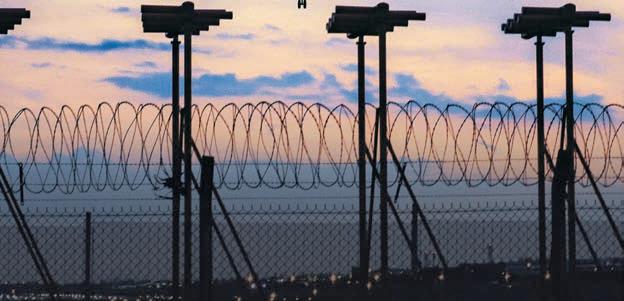
The carrier asked the commission to protect all overflights during the strikes, require a 72-hour notice of employee participation and a 21-day notice period for industrial action.

So is it up, up and away for the aviation industry? It certainly looks that way, at least for some carriers. You can’t help but note the confidence dripping off market updates from low-cost carriers like Ryanair and Easyjet, who right now sit in the sweet spot of a costconscious economy combined with a still-evident post-pandemic desire to get away on a regular basis.
The more interesting question for other players in the market is whether the business travel market ever reaches the heights it did prepandemic. Signs are that it may not; yesterday, American Airlines’ chief commercial officer Vasu Raja told the
NICHOLAS EARL
OIL prices pitched north on both major benchmarks yesterday after the world’s chief exporter and leading OPEC member Saudi Arabia announced plans to cut output by another million barrels per day from next month.
The rebound in prices extends
gains of more than two per cent from Friday after Saudi Arabia first trailed its pledge to slash production, when the country’s energy ministry announced its output would drop to nine million barrels per day (bpd) in July from 10m barrels per day in May.
At the latest OPEC+ meeting yesterday, the world’s most influential oil cartel agreed to
maintain its heavy cuts of 3.7m barrels of oil per day into 2024, while its most influential member announced further reductions on a unilateral basis. Oil markets have been weighed down by gloomy economic data from Asian economies including the Chinese market, which has lowered demand expectations.
Wall Street Journal it was ‘rethinking’ its sweetheart deals with corporations. A report from Deloitte Insights said there was a “limited upside” for businesses relying on business travel. What might that mean for carriers? Well, there will certainly be a short-term shift to leisure routes. But if long-haul profitability, often driven by tired, slightly grumpy and paid-onexpenses business travellers doesn’t come back, there may still be some turbulence ahead. AS
France currently protects a number of domestic and short-haul flights through minimum service rules, while some other European countries instead protect overflights during strikes. Ryanair argue “this is unfair.”
Ryanair’s statement said that there had been 58 days of ATC strike action over the past five months in France, and that this was over 11 times higher than 2022.
The airline officially submitted its petition to von der Leyen last week.
A spokesperson from the EU commission said: “the Commission has taken note of the petition launched by Ryanair to protect overflights in the event of strikes.”
NICHOLAS EARL
THE FUTURE of the North Sea’s largest undeveloped oil and gas field remains unclear, with a decision due to be made in the first half of this year now being pushed back.
Ithaca Energy, which holds a 20 per cent stake in the Rosebank oilfield, is still engaged in talks with the government over the project amid concerns about the UK’s investment climate.
The FTSE 250 energy firm has been holding back-and-forth talks with the government over the project for nearly three months, concerned about the effects on investment of the 75 per cent windfall tax –which could impact the financial viability of the project.
It now no longer expects the project to be approved by the end of this month, removing the prediction from its first quarter results announcement last week after consistently including
that expectation in its trading updates.

Equinor, the majority owner of Rosebank with an 80 per cent stake, is keen to see the project through, which has the potential to produce 300-500m barrels of oil – roughly equivalent to eight per cent of the UK’s entire oil output between 2026 and 2030.
The project still needs to be approved by the Offshore Petroleum Regulator for Environment and Decommissioning and the North Sea Transition Authority before it finds its way to energy security secretary Grant Shapps’s desk,. He is widely expected to rubber stamp the project it if it reaches that stage.
The proposals, however, have faced sustained criticism for their potential environmental impact, with Labour’s climate change secretary Ed Miliband calling for the project to be abandoned. Ithaca was contacted for comment, while the Treasury declined to comment.
LAURA MCGUIRE
AMICORP’s fund services arm will float on the London Stock Exchange this week with plans to raise $6.47m (£5.21m) in new ordinary shares, and scale up its IT operations.

“London retains its status as the world’s leading market for the financial services sector and we
CHARLIE
LONDON-based venture investor IQ Capital bagged £322m ($400m) across two funds yesterday as the firm looks to ramp up its investment in ‘deep tech’ startups across areas including artificial intelligence and robotics.
The fresh funding had been raised across two funds, a $200m growth fund focusing on later stage companies and a fourth $200m venture fund.
believe a listing here will give us the best chance of executing our plan to consolidate the fragmented fund services market,” Kin Lai, chief executive officer of AMIF, said.
The news will come as a welcome boost to the City’s capital markets, which have been rejected by a number of major companies that have instead decided to float in New York.
Kerry Baldwin, co-founder of the firm and former chair of the British Private Equity and Venture Capital Association (BVCA), said in a statement that deep tech firms “will play a pivotal role” as the UK and Europe “continue to lead the way in developing technology that will have a lasting global impact”.
“IQ Capital backs IP-rich technologies with the potential to dominate massive global markets, at a time when deep tech investment is at the forefront of investor’s minds, topping $17bn in 2022,” she added. The new cash had been raised from a range of backers including statebacked British Patient Capital.
APPLE unveiled an augmented-reality headset called the Apple Vision Pro at its annual software developer conference yesterday, its first big move into a new product category since the introduction of the Apple Watch nine years ago.
CEO Tim Cook described it as "spatial computing".
"It's the first Apple product you look through, not at," Cook said.

Apple's human interface chief Alan
THE UK’s financial regulators will be in focus as lawmakers consider proposals to boost watchdogs’ accountability.
A range of amendments to the Financial Services and Markets Bill have been put forward, focusing on the scrutiny of regulators as the bill returns to parliament this week.
Regulatory scrutiny has been a key concern for politicians and figures in the industry since the UK’s departure from the EU, as regulators inherited much greater powers.
These concerns have only been heightened by a growing sense that the City is falling behind global peers, partly as a result of regulation.
Various proposals have been put forward to enhance the accountability of the UK’s financial regulators, the Prudential Regulation Authority (PRA) and the Financial Conduct Authority (FCA).
One of the most important reforms proposed by the Bill is the introduction of a competitiveness mandate for the regula-
tors. The government has tabled measures to make a regulator report twice to the Treasury on “how it has complied with its duty to advance the competitiveness and growth objective”.
Lord Bridges has retabled an amendment to create an Office for Financial Regulatory Accountability (OFRA) within a year of the bill’s passage into law. The role of OFRA would be to “examine and report on the performance of the FCA and the PRA.”
Amongst other things, Bridges argued the body should prioritise scrutiny of regulations which “restrict domestic competition” and “reduce international competitiveness”.
Partner at Macfarlanes Michael Sholem said OFRA “seems to us to be a positive step, especially given the wide remit proposed

Lord Tyrie proposed the Regulatory Decisions Committee (RDC), a subcommittee of the FCA , be made independent –with the chair of the body being nominated by the Chancellor and the body being given independent funding.
Dye said users will select content inside the goggles with their eyes, tap their fingers together to click and gently flick to scroll.
The device also has an exterior display that shows the user's eyes to people on the outside world.
For work uses, Apple showed how the headset can be used with a trackpad and keyboard to work like a traditional computer with multiple displays.
Apple did not make any major announcements about generative AI
products similar to ChatGPT or Google's Bard search engine, but it quietly imbued several smaller features with AI, like live transcriptions of voice mails.
The headset launch will see Apple test a market crowded with devices that have yet to gain traction with consumers and put it in direct competition with Facebook-owner Meta Platforms.
Shares of the iPhone maker rose 2 per cent to hit a record high of $184.95 ahead of the launch.
IN THE cost of living crisis, opting for an affordable night in front of the television (watching Succession, for example, as pictured) has only become more popular. In May, spending on subscription services and takeaways saw their highest increases so far this year – rising 10.2 per cent and 13.1 per cent respectively compared to rises of 6.4 per cent for pubs, clubs and bars.

 JACK BARNETT
JACK BARNETT
FAMILIES splashing cash despite high inflation and interest rates crimping their budgets is keeping Britain’s services economy motoring along, a closely-watched new survey shows.
S&P Global and the Chartered Institute of Procurement and Supply’s (CIPS) final purchasing managers’ index (PMI) for the services sector,
which generates about £2 in every £3 in the UK, was at 55.2 points in May.
That figure was down slightly from April’s 55.9 point reading, but up from an initial estimate of 55.1. It was in line with the City’s expectations and far above the 50-point threshold that separates growth and contraction.
Decent demand for “staycations”
and leisure activities kept the PMI aloft, while spending on technology
services pumped growth.
Tim Moore, economics director at S&P Global Market Intelligence, said: “Service sector businesses have experienced strong growth so far in the second quarter of 2023, fuelled by resilient demand.”
However, demand in the UK economy is poised to eventually recede as higher mortgage bills kick in after households’ current contracts end.
NICHOLAS EARL AND JESSICA FRANK-KEYES
CONSERVATIVE MPs have slammed the Labour Party over its decision to hire a former Extinction Rebellion lawyer as a senior political advisor. It has been revealed that Tobias Garnett, who has worked as a political advisor for the Labour Party since April 2020, previously
worked as a lawyer for the activist group.

In an article he wrote for the Guardian in 2019, he is described as “coordinator of Extinction Rebellion’s legal strategy team”.
“As these eco-zealots line Starmer’s pockets with their donations and whisper in his ear, Labour are plotting to smash up British industry, kill thousands of jobs and leave us at
the mercy of foreign powers,” Lee Anderson, deputy chairman of the Conservative Party, said Tory MP Iain Duncan-Smith said Labour was “moving from being a national political party that wishes to govern to a protest group” adding that Labour should reconsider its decision to hire him. Labour and Extinction Rebellion have been contacted for comment.

LABOUR leader Sir Keir Starmer has lent his support to the UK’s nuclear industry calling for a vast ramp-up in projects and slamming the Tory’s “shambolic” failure to open no nuclear power plants during its 13 years of power.
Ahead of a visit to under-construction nuclear plant Hinkley Point C in Somerset, the Labour leader said “nuclear is a critical part of the UK’s energy mix” and vowed to “get Britain building”.
“The British people should be benefitting from our country’s natural resources, but the Tories’ woeful record is holding us all back,” Starmer said
Despite Sizewell C and Hinkley Point C being identified in 2009, both are not operational.
Currently, nuclear generates about 7GW of the UK’s power, but that could decline as the country’s ageing nuclear fleet is set to go offline over the next two decades.
The nuclear sector backed Labour’s push to bolster nuclear power, with Tom Greatrex, chief executive of the Nuclear Industry Association stating that Starmer was absolutely right to “highlight the need to move at pace on new nuclear projects in the UK.”
“Starting with Sizewell C, getting on now with both large-scale projects and a fleet of small modular reactors will improve energy security, provide economic activity and protect the environment,” Greatrex told City A.M.
“Understanding that huge opportunity and signalling a determination to move at pace will be welcomed by manufacturing, engineering and energy industries at this crucial time,” Greatrex added.

The decision to get behind nuclear power comes after the party’s green energy transition plans came under fire from GMB trade union leader Gary Smith.

Smith said that Labour’s plan to end new oil and gas licences in the North Sea was “naive”.


JESSICA FRANK-KEYES
BUSINESSMAN Gary Lubner is set to donate £5m to Labour to bolster its coffers ahead of the next election battle.
Lubner told the Financial Times he had wanted to help Labour leader Sir Keir Starmer get the party into power “for a long time”.
The tycoon gave £500,000 to Starmer’s party in the first quarter of 2023, according to Electoral Commission figures set to be released on Thursday,
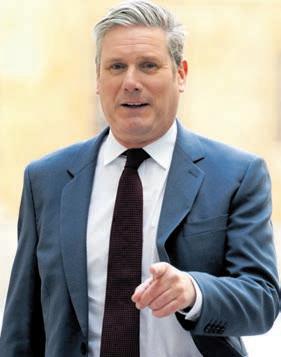

the paper reported.
“This is the beginning. I intend to give more as we move towards the general election,” he said.



“In the long list of Tory failures in the last 13 years, Brexit is top of the list. It’s a disaster. There’s nothing good about it. Nothing,” he said.
Lubner, who made hundreds of millions as CEO of Belron, the world’s leading car glass repair firm and owner of Autoglass, confirmed £5m was a reasonable figure to predict.

THE FINANCIAL Conduct Authority
(FCA) has hit City broker ED&F Man Capital Markets with a record £17.2m fine for “serious failings” in its oversight of a murky cum-ex trading strategy.
The FCA said the failings allowed ED&F Man to collect millions in fees as its clients illegitimately
CHARLIE
FINTECH lender Zopa has called in a former Deutsche Bank executive to its board in the first of a series of senior appointments to its top team ahead of an IPO, City A.M. can reveal.
The London-based fintech lender said it had appointed Pippa Lambert, former global head of human resources for Deutsche Bank, to chair its remuneration committee.
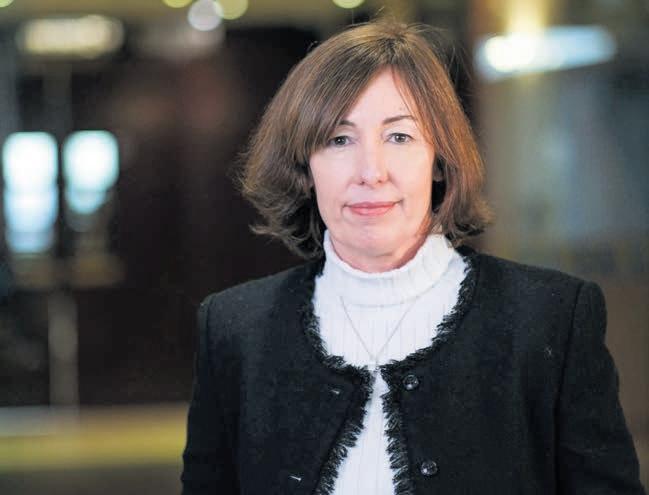
The appointment is set to be the first
in a number of C-suite figures with IPO and public market experience, sources familiar with the matter told City A.M. Zopa declined to comment on who the next senior appointments would be but two further hires are understood to have already been made.
The firm has been open in its ambitions to shift on to the public markets, with London their “preferred option”, but has shelved the plans due to turbulent market conditions over the past year.
CHRIS DORRELL
INSURANCE giant Aviva joined the dormant asset scheme yesterday as the programme opened up to pensions and insurance firms.
Aviva will join over 40 banks and building societies that are currently in the scheme.
Kirsty Cooper, group general counsel and company secretary, said Aviva had been working with the Reclaim Fund and dormant asset scheme for “a number of years” to expand the fund.
The dormant asset scheme has operated since 2011. In that time around £900bn has been distributed to support causes such as financial inclusion. Its managers say its work is more important than ever during a cost of living crisis.
So far the scheme, which is operated by the Reclaim Fund, has only been open to banks and building societies. However, last year the government opened the scheme up to include other financial services firms.
Aviva’s entry is the first since the scheme expanded with expectations that many more will follow.
Jane Hanson, chair of the dormant as-
sets expansion board, said “the momentum that built in the banking sector will be replicated in the pensions and insurance sectors... I’m sure others will join”.
The Reclaim Fund estimates that up to £880m could be made available through the scheme’s expansion, although chief executive of the fund Adrian Smith said it will “take some time to get going”.

Dormant assets are financial products, such as bank accounts and pension funds, that a customer has not used for a specified period of time – 15 years in the case of bank accounts and seven for pension funds.
Financial institutions have to attempt to reunite the funds with the account holders, but if that fails the funds can be transferred to the Reclaim Fund who take on the liability. However, dormant assets remain the property of their owners and can be claimed by account holders in perpetuity.
Smith said other sectors, such as investment and wealth management funds, are likely to be able to join the scheme by the end of this year.
City minister Andrew Griffith said the expansion of the scheme was “a significant moment”.
reclaimed tax from the Danish authorities.
Cum-ex trading strategies involve building a position in a jurisdiction which offers favourable tax treatment to the holder. From 20122015, the FCA said ED&F Man enabled “significant volumes of dividend arbitrage trading on behalf of clients, allowing clients to make withholding tax reclaims”.
The fine marks the fourth case brought by the FCA against cum-ex trading and is the largest fine for cum-ex trading so far.
ED&F has not disputed the FCA’s findings and agreed to settle and has qualified for a 30 per cent discount. The fine includes £5.06m of income forfeited by MCM as a result of their breaches in relation to cumex trading.




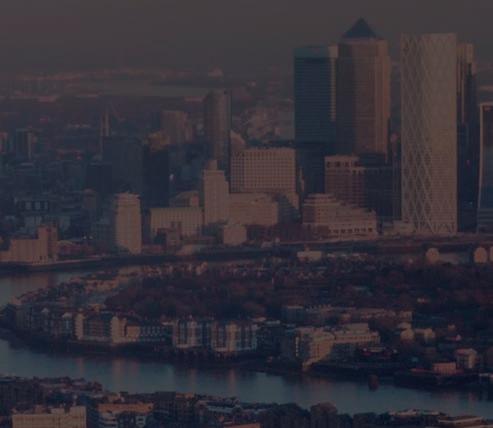





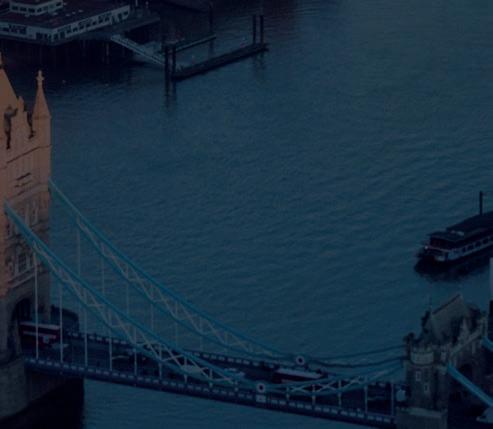




AMIX of factors are buffeting the UK economy right now. Spending power is being crushed by high inflation eroding family finances.
House prices are coming off their heady heights as sellers drop prices to source buyers amid higher mortgage rates.
External demand is thinning in response to weak consumer confidence amid a global cost of living crunch.
One area that’s yet to sag sharply is business investment, which may surprise many people - after all, it's the area that lots of experts have tagged as a weak point of the British economy especially post Brexit.
But it’s been on the recovery of late, up 0.7 per cent in the first three months of this year, meaning the difference between its present and pre-pandemic level is the slimmest since the virus first spread here.
That uptick is all the more unexpected given the dire predictions about where economic growth has been headed this year.
Remember –the Bank of England thought this year we’d slump into the longest recession in a century last November.
Yet, the early 2023 investment jump is a bit of a wolf in sheep’s clothing. It’s been driven by temporary factors that have endowed it with an artificial gloss.
Prime Minister Rishi Sunak’s superdeduction –which allowed businesses to take off 130 per cent of the value of certain investments from their corporation tax liabilities –finished in March.
As analysts at Pantheon Macroeconomics put it: “The breakdown of the business investment data for Q1 suggests that investment was artificially boosted by businesses bringing forward planned spending in order to take advantage of the government’s super-deduction policy.”
A front-loading effect happened. Lots of firms scrambled to bag that tax break. You’d expect they won’t need to invest much more this quarter.
Chancellor Jeremy Hunt rightly recognised this cliff edge and tried to smooth it out by launching a less generous successor to the super-deduction.
From now until April 2026, businesses can offset 100 per cent of certain capital spending from their profit tax bill.
That’s good policy as it uses the tax system to nudge businesses into behaviours that yield a greater benefit to the economy's longrun health instead of prioritising short-term gain.
Whether it’ll be enough to prevent a big drop in investment spending is murky.
Higher interest rates are an absolute killer for business investment, especially when firms’ debts are structured around spot rates instead of being fixed and locked in over a long period. A huge chunk of corporate debtabout £8 in every £10 –in the UK operates this way.
Bank of England officials have pushed rates up to 4.5 per cent and markets think they’re on track to push them to at least 5.25 per cent to tame inflation. That would lift rates on new corporate lending to about 6.5 per cent,
Recessions are seemingly all round for the world’s most advanced economies, according to a fresh set of forecasts out from investment bank Deutsche Bank to kick off this week. The global economic slowdown will be spearheaded by the US finally succumbing to the Federal Reserve’s aggressive interest rate hikes. The globe’s largest economy is on course for the first central bank-engineered recession in four decades, Deutsche Bank reckon. They’ve also cut German GDP growth this year to minus 0.3 per cent. That means Britain won’t be the laggard in Europe.
according to Pantheon Macroeconomics.
That’ll make a lot of potential investment opportunities unviable, unless there’s a productivity miracle, which is a dead rubber in the UK’s case.
Yes, Britain is now tipped by the IMF to dodge a recession, though that call came before markets ratcheted up their peak
interest rate expectations.
The threat of a deeper slump is very much back on the table if Bank Governor Andrew Bailey and co meet market expectations, which would amplify businesses’ caution over how they manage their finances.

Repaying debt with any excess cash may be a greater priority than buying new IT equipment or moving to a new office.
Certain sectors are set to trim capital expenditure more than others. Real estate and manufacturing are highly sensitive to rate changes due to their end customers typically borrowing to fund spending.
Much has been made of the UK’s low growth problem since the 2008 financial crisis, and there is now a consensus behind its root cause: low productivity improvements primarily fuelled by poor private and public investment. For economy-wide investment, we rank second bottom in the OECD. For the country to turn its fortunes around and aim for better growth and living standards, investment must turn on a pinhead and get motoring upwards. The chances of that happening any time soon though are slim.
Hunt’s decision to lay down full capital expensing will keep investment higher than it otherwise would have been.
But until inflation is finally killed, freeing the Bank to slash borrowing costs, businesses will probably tread water.
CHARLIE CONCHIE
A GROUP of crypto-friendly MPs have called for the appointment of a dedicated “crypto tsar” to oversee plans to turn the UK into a digital asset hub today, as stark divisions emerge in parliament over the future direction and role of the country’s crypto industry.
In a new report, the All Party Parliamentary Group on Crypto and Digital Assets also warned that the UK is at risk of being left behind by more cryptocurrency-friendly markets overseas if the sector is not regulated soon.
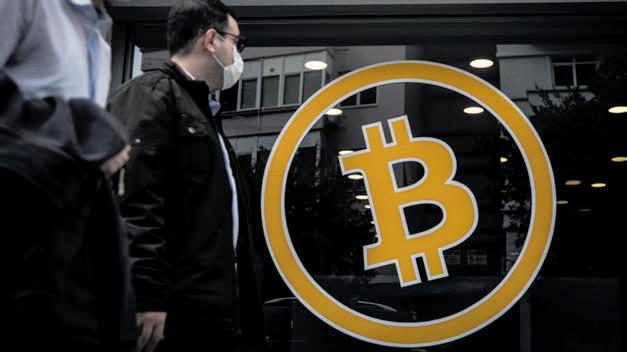
The government must move “within the next 12-18 months to ensure early leadership within this sector,” the
report said.
The demands come in sharp contrast to the crypto-sceptic comments from the Treasury Select Committee last month, which called for the industry to be regulated in the same way as gambling, claiming “retail trading in unbacked crypto more closely resembles gambling than a financial service”.

City A.M.’s economics editor Jack Barnett takes a deep dive into the state of the economy in his weekly column
WHAT I’M READING
The market mood is picking up with the S&P 500 enjoying its best week since March. The Dow surged over 2 per cent on Friday, its biggest one-day gain since January and the Nasdaq Composite completed its sixth straight week in the green.
Supporting markets was the US nonfarm payrolls figure which hit 339,000 in May, much higher than forecasts for 190,000 thanks to new jobs in professional and business services as well as government and healthcare. While the unemployment rate picked up to 3.7 per cent, it is still near the lowest level since 1969. The US economy has enjoyed 29 consecutive months of job creation, highlighting the underlying strength of the labour market stateside.
A debt ceiling disaster has fortunately been swerved, removing one of the biggest near-term risks to markets and providing a tailwind to equities. President Joe Biden claimed this was a ‘crisis averted’ after US Treasury Secretary Janet Yellen said last month that a failure to raise the
government’s £3.4 trillion debt ceiling would result in “an economic and financial catastrophe.” Despite a high-stakes political battle, the US has avoided its first default in history thanks to a bipartisan agreement, allowing the Treasury Department to continue paying its bills.
The oil market has also enjoyed a tailwind thanks to Saudi Arabia which announced plans to reduce its oil output by 1 million barrels per day in July, landing its production level at around 9 million barrels per day, a multi-year low. This has helped to offset some of the oil market weakness experienced over the last year, reflecting concerns about softer global demand. Clearly uncertainties remain with a gloomy global growth backdrop, China’s bumpy postCovid recovery, elevated inflation levels and the potential for further Fed hikes, but it is encouraging to see some positivity with a debt ceiling deal, a strong US labour market and more bullish oil market dynamics.

The PLANNING ACTS and the Orders and Regulations made thereunder

This notice gives details of applications registered by the Department of The Built Environment Code: FULL/FULMAJ/FULEIA/FULLR3 – Planning Permission; LBC – Listed Building Consent; TPO – Tree Preservation Order; OUTL – Outline Planning Permission
33 Creechurch Lane, London, EC3A 5EB
23/00350/FULLR3
Temporary installation of a vinyl artwork measuring 8.69m in width and 19.6m in height, for a period of up to 24 months, as part of the 12th edition of Sculpture in the City, to be taken down on or before 3rd June 2025: untitled by Arturo Herrera.
Aviva UK Central Services, 1 Undershaft, London, EC3A 8EE 23/00379/FULLR3
Temporary installation of a sculpture measuring 3.5m(w), 3.5m(d), 3.5m(h) on an individual plinth measuring 4.5m(w), 4.5m(d), and 0.15m(h), for a period of up to 24 months, as part of the 12th edition of Sculpture in the City, to be taken down on or before 25th June 2025: Pittu Pithu Pitoo by Simeon Barclay.
St Helen’s Bishopsgate, Great St Helen’s, London, EC3A 6AT
23/00412/FULLR3
Temporary installation of three sculptures displayed on one plinth measuring 3.25m(w), 2.0m(d), and 0.4m(h), for a period of up to 24 months, as part of the 12th edition of Sculpture in the City, to be taken down on or before 3rd June 2025: Duo, Neo-lithic, and Rain Mountain by Isamu Noguchi.
10 Trinity Square, London, EC3N 4AJ 23/00424/FULL
level with a 1.4m high new glazed balustrade and relocating it towards the parapet line.
10 Trinity Square, London, EC3N 4AJ 23/00425/LBC
level of Grade II star building, with a 1.4m high new glazed balustrade and relocating it towards the parapet line.
9A Devonshire Square, London, EC2M 4YN 23/00476/LBC
Installation of plasterboard and glazed partitions glazing to existing meeting room and minor
87 Moorgate, London, EC2M 6SA 23/00500/LBC
work, goose neck lighting to fascia. Installation of one externally illuminated projecting sign. Replacement of ironmongery on all doors.
4 St Paul’s Churchyard, London, EC4M 8AY 23/00510/FULL
associated works.
Guildhall Building Structure, Guildhall Yard, London, EC2V 7HH 23/00528/LBC
Cleaning and minor repair of the George Dance the Younger Porch to the Guildhall and emergency repairs to the accessible areas of the Great Hall roof.
Cloisters, 3rd Floor North, Pump Court, Middle Temple, London, EC4Y 7AB 23/00529/FULL
class C3).
You may inspect copies of the application, the plans and any other documents submitted with it on-line or telephone 020 7332 1710.
Anyone who wishes to make representations about this application should do so online: Any observations must be received within a period of 21 days beginning with the date of this notice (unless otherwise stated) and will be taken into account in the consideration of this application.
In the event that an appeal against a decision of the Council proceeds by way of the expedited procedure, any representations made about the application will be passed to the Secretary of State and there will be no opportunity to make further representations.

Sony’s “Spider-Man: Across the Spider-Verse” scored an estimated $120.5 million at the US box office over the weekend, making it the second biggest movie opening of 2023 after “Super Mario Bros. Movie” from Universal. EntTelligence reported that the latest Spiderman movie is understood to have attracted audiences of over 9 million last weekend, representing more than half of all movie ticket sales from Thursday to Sunday, highlighting the popularity of Miles Morales and the Marvel movie franchise.

£ There is record demand for longterm loans among those making their first steps onto the UK property ladder. According to UK Finance data, 19 per cent of all firsttime buyer mortgages in March were for terms of 35 years or longer. This is the highest percentage since records began in 2005 and a sharp increase from 9 per cent seen in December 2021 at the start of the Bank of England’s rate hiking path. Mortgages have become increasingly expensive as the central bank battles to tame inflation.
This is a Saudi lollipop... We wanted to ice the cake
Saudi Energy Minister Prince Abdulaziz after the Kingdom announced plans to cut oil production
£ Analysts are turning less bullish on China. Morgan Stanley has reduced its target for the MSCI China Index from 80 to 70 but retains its overweight assessment. It follows a similar move from Goldman. Both banks have highlighted their worries about a weaker currency and earnings. China has had a bumpy recovery since Beijing unwound its antiCovid zero tolerance lockdown measures late last year. Shares in China proxy play Burberry, for example, have struggled since April.
The third series of our podcast ends this week with Gabby Logan chatting to Josh Lewsey, the England Rugby World Cup winner. Despite his success, Josh always planned for a career in business and is now a financial services CEO in Hong Kong. He takes

listeners inside the 2003 England rugby camp, but tells Gabby why he prefers to look forward and how he aligns his investments with his personal goals. All episodes from Series 13 are still available, featuring Lord Jim O’Neill, Dame Jayne-Anne Gadhia, and Deborah Meaden.
Ukraine is believed to be planning an offensive in the east of the country to retake ground currently occupied by Russia

JAMES SILVER
A SERIES of small-scale offensives by the Ukrainian military yesterday appeared to signal the start of a longawaited offensive in the east of the country, as Kyiv looks to dislodge Russian invaders from its territory.
Sources in Ukraine’s armed forces said they had attempted to move on areas around the battered city of Bakhmut but were coy on whether this represented the beginning of a new stage of the war.
Ukrainian authorities posted a video circulated on social media in which soldiers repeatedly ‘shh’ed’ viewers, with
the tagline “plans love silence,” seemingly encouraging Ukrainians not to spread information on what they may see on the ground on social media. Russia claimed it had repelled one attack in the Donetsk region, but that report could not be verified.
Yesterday Ukrainian president Volodymyr Zelensky met James Cleverly, the foreign secretary, in Kyiv. Zelensky thanked the latter for Britain’s support and called for more munitions support.
Elsewhere the country’s foreign minister Dmytro Kubela said his country’s future membership of NATO would “probably” only be possible at the end
of the war.
“NATO membership cannot stop this war, but NATO membership will stop further wars. This is why the best way to ensure security in the region is to come to the moment when Ukraine becomes a member of NATO,” he said in an interview in Kyiv.
Yesterday the leader of Wagner, the mercenary force which did much of the fighting to secure Bakhmut before handing the area to Russian troops, said it was a “disgrace” that some troops were “quietly running away” in the face of Ukrainian attacks, in the latest attack on the military’s top brass.
Where interesting people say interesting things. Today, it’s Victoria Scholar, head of investment at Interactive Investor
Look
enough and you’ll find reasons for optimism on the economy



London’s FTSE 100 lost momentum in the afternoon session yesterday after new data revealed the US economy is wilting under the weight of the Federal Reserve's interest rate hikes.
The capital’s premier index slipped 0.1 per cent to 7,600 points, while the domestically-focused mid-cap FTSE 250 index, which is more aligned with the health of the UK economy, dropped 0.19 per cent to 19,113.55 points.
London’s top index zipped higher during opening exchanges as oil giants soared after OPEC+ amplified production cuts, putting upward pressure on prices.
The group of major oil-producing nations yesterday announced they would extend existing production cuts that were due to end this year to 2024.
Saudi Arabia, the OPEC+ cartel’s de facto leader, tabled a shock output drop, taking supply to 9m barrels per day from 10m barrels per day.
Those moves sent oil prices on an upward spiral yesterday, with WTI and Brent Crude, the globe’s top benchmarks, each climbing around 1.5 per cent.
In response, investors piled into Lon-




don-listed oil megacaps Shell and BP, with the pair advancing 1.27 per cent and 1.12 per cent respectively. The pair shed most of those gains by the close.
“The decision by Riyadh to reduce production by a million barrels a day in July, and the pledge from other OPEC+ members to lower targets again next year was aimed at shoring up the oil price to break even levels,” Susannah Streeter, head of money and markets at Hargreaves Lansdown, said.

“Oil prices are trapped in conflicting tides between production cuts on one hand, and concerns about demand as China’s recovery slows, while a recession in the US looms,” she added.
Numbers from ISM out around 3pm UK time revealed the US services economy is running at its weakest level in six months.
ISM's services activity index slipped to 50.3, a big undershoot compared to Wall Street's expected 52.4 reading, adding “to worries about the outlook for the economy,” James Knightley, an analyst at Dutch bank ING said. That downbeat release ricocheted through the City, sending the FTSE 100 rapidly lower heading into the final hour of trading.
Advanced Medical Solutions said yesterday it had received approval from the US Food & Drug Administration for use of its LiquidBandFix8 in hernia surgery. This approval was granted ahead of schedule. Analysts at Peel Hunt said "this is a positive for the company". It was rated a 'Hold' with a target price of 290.0p.
Cloud computing firm iomart announced the purchase of Extrinsica, a Microsoft Azure partner. Analysts at Peel Hunt said Extrinsica's expertise "aligns with iomart's strategic goal of being an expert in the secure hybrid cloud market." They noted that it also brings new customers to whom iomart's range of products can now be marketed. They maintained an 'Add' rating with a target price of 145.0p.
CHIEF MARKET ANALYST AT CMC MARKETS UKHouse developer Watkin Jones has announced a forward-funding deal for a built-torent scheme in Belfast with a total development value of £155m. The scheme is due for completion in summer 2026. Analysts at Peel Hunt noted that while the deal does not change forecasts, it should "provide some support and reassure investors". They held a 'Buy' rating with a target price of 140.0p.

"The US dollar had been trending higher for most of yesterday until the latest ISM services report for May hit the wires at 3pm. If Friday’s payrolls report was good, this was the opposite –with little in today’s report to support what we saw in the May payrolls numbers."
MICHAEL HEWSON
trade-offs involved.
IS IT Wrong to Bring a Child Into
Our Warming World?” read a letter to the New York Times last week. Doom mongering is, unfortunately, what we’ve come to expect from the world’s leading hand wringing newspaper.
But over the weekend, an old friend asked a similar version of the same question. “I just don’t know,” he said, “if we should have kids when things with the environment are so bad at the moment, and seem to be getting worse?” He is eminently sensible - a homeowner in a Nottingham suburb, public sector professional, who should shortly shuffle into “centrist dad” territory. Yet his fears about global warming are stopping him in his tracks. This wave of pessimism is particularly acute when it comes to the climate. The environment almost always features in the top three concerns of the UK public alongside the cost of living and the NHS. That’s no bad thingthe government needs to be doing more to tackle climate change and improve our energy security. But a staggering one in three young people say they feel “overwhelmed” or “scared” about climate change. Every report of “eco-anxiety” suggests that a rational concern is turning into something more pernicious.
And such gloom is not confined to the UK. While we look fawningly at President Biden’s climate-focussed Inflation Reduction Act, two thirds of US citizens think their economy will be weaker in 2050.
Pessimism is a real problem. It means we make decisions like not having children when the UK’s fertility crisis means we are creeping towards a demographic trap. It can stop us thinking for the long term, meaning we don’t save for retirement or invest in nascent technologies - think of Nick Clegg’s dismissal of nuclear energy a decade ago.
Pessimism also opens us up to spe-
cious arguments from political extremes. Just Stop Oil’s seductively simplistic calls to halt UK domestic oil production would ultimately leave us more reliant on foreign states, just as OPEC has decided to cut production to raise the oil price. And although the Truss mini-budget was wrapped up in boosterish language it had an underlying doomster logic: things can’t get much worse, why don’t we bet the house? There is a glimmer of hope. Recent polling from Onward found that Millennials - those between 25 and 40 year olds - are uniquely optimistic. Just over
half think the next generation will have better opportunities - more than the slightly older Gen X at 35 per cent and the even older Baby Boomers at 44 per cent. Although Millennials are frustrated by a lack of housing, high costs of childcare, and eye watering marginal tax rates, they still believe that things can get better - and the environment is central to their politics. What does that mean for politicians? Given the challenges we face, they can’t get away with pretending everything is fine. Voters want leaders who recognise the scale of the net zero transition and are pragmatic when it comes to the
LONDON is a city steeped in history, from the Tower of London to Buckingham Palace. It has been the home to thespian greats who have performed in venues in the West End and in Shakespeare’s Globe. It’s also the major European city with the highest number of green spaces.
If culture isn’t for you, then you have the art that is sport. London is the host to seven Premier League football teams, three Gallagher Premiership rugby teams, Wimbledon and the Oval and Lord’s cricket grounds. Hospitality is the glue that binds all the things that makes London great.
As a sector, it provides £36bn and 700,000 jobs to the capital. But London’s hospitality industry remains six months behind the other UK destinations in terms of its post-pandemic recovery.
Tourists are no longer flocking to London in their typical numbers. In 2023, we are expecting a 14 per cent decrease in tourists visiting the capital compared to 2019. Sadiq Khan needs
Samuel Kasumuto take a leading role in dealing with this.
Londoners aren’t taking advantage of what London has to offer either. Museums in particular have struggled to attract guests, with both the iconic National Gallery and the Victoria and Albert Museum witnessing a 40 per cent decrease in visitors compared with 2019.
The hospitality industry is being undermined by London’s transport infrastructure. Tourists and Londoners have expressed frustration with faulty tube lines and inconsistent bus routes.
Sadiq Khan’s proposed Ulez expansion will provide further challenges to the hospitality sector.
I have a plan to help save our tourist industry and get London up and moving once again. The first thing I will do is re-establish the mayor of London’s role as being the ‘Chief Marketing Officer’ for London.

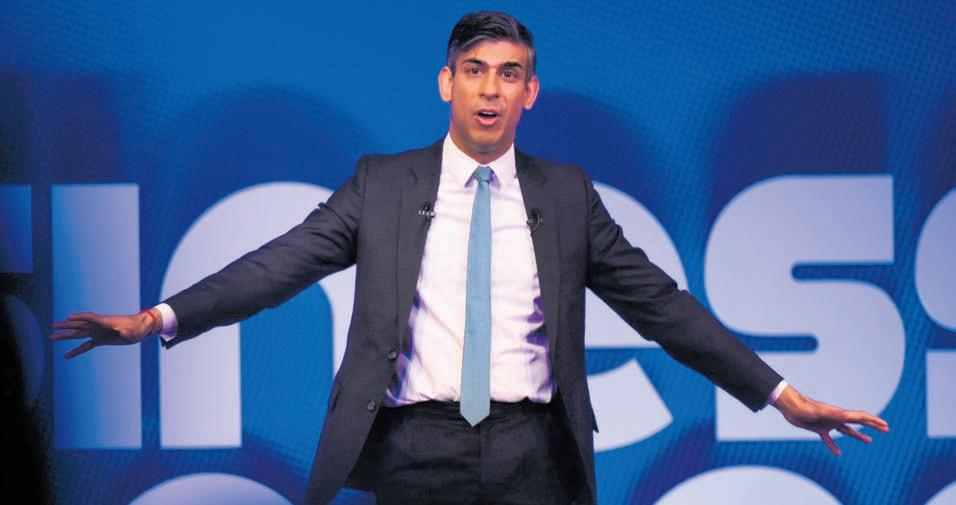
I will scrap London & Partners, the agency in charge of promoting London across the world, and invest resources into VisitLondon to promote and create relationships with cities both throughout the UK and globally. It shouldn’t be the case that Pennsylvania spends more on attracting tourists than London does. We will also harness the power of London’s world-leading private marketing industry to help target the right audiences and bring them to London.
I will establish a bi-annual Commonwealth Business Summit and establish a new European Strategic Partnership to ensure we remain a competitive option for European businesses looking to float on a stock exchange. We will once again make London, for both tourists and businesses, the place to be. If it goes ahead, I will reverse the
But voters also need some hope. The climate crisis is an era-defining challenge - but if we play it right, we can steadily decarbonise while creating thousands of jobs. Of course children will be born into a world with new challenges - but it’ll also be at a moment in history with the highest levels of prosperity, longest life expectancies, and lowest levels of discrimination. Optimism doesn’t mean lying to voters or obscuring problems, it means setting out a credible path to something better. In trying to motivate the public to support net zero, we need a dash of the sunlit uplands. Motivating through fear or shame won’t make people change their behaviour and too many are ending up hopeless. Every warning about carbon-emitting combustion engines should come with a nod to cleaner, fresher air. Each pledge to accelerate retrofitting needs to highlight the promise of warmer homes that are cheaper to heat.
The problem with this optimism is it can feel profoundly un-British. Look at the backlash Jeremy Hunt received when he warned that a doom loop on the economy risks becoming self-fulfilling. We are inherently suspicious of anyone a little too sunny, particularly if they’re wearing a rosette. So maybe it’s fitting to remember an instructive quote from an American very different from the New York Times’ nervous letter writer. When challenged on his youthful exuberance by a journalist, John F Kennedy rebutted firmly: “I am an idealist without illusions.”
£ Adam Hawksbee is deputy director of the think tank Onward


ULEZ expansion that threatens to cripple London. I will also work to enhance our existing infrastructure by upgrading our ageing tube lines, extending light rail and improving our bus connections. This will not only help our hospitality sector by unlocking all of London, but help ensure the whole of London can stay on the move.
As mayor of London, I will work to promote London as the place to hold major events. The London NFL games have brought thousands of fans from America, supporting London’s economy and providing our hospitality industry a much-needed boost. We should take this as inspiration, and work with countries around the world to bring their culture and events to the capital.
London is at its best when people can enjoy all that the city has to offer. We need to unlock London once again to both Londoners and tourists. It is time for a mayor who understands that.
Samuel Kasumu is a prospective Conservative London mayoral candidate
 £
£
BACK AGAIN Like hay fever and summer hits, Matt Hancock keeps on coming back when you less expect him. Now he’s part of the Boris Johnson’s Covid-19 inquiry row, as a member of a WhatsApp group including Johnson, Dominic Cummings and others. What a team...

[Re: US Senate approves debt ceiling bill narrowly avoiding traumatic default, June 2]
US Congress has averted what would have been an historic federal default, bringing renewed confidence to the stock markets around the globe. As expected, the major indices in Europe and UK have been rallying in reaction to the passing of the bill.
Conversely, the value of traditional safehaven assets like gold have been
experiencing decrease. No doubt, this reflects investors seeking out share opportunities, knowing there is less likely to be a sudden economic downturn or bearish trading conditions in the short term.
However, this rally is likely to be shortlived. Inflation remains a top concern, and with the Federal Reserve and ECB meeting this month, there could be further rate hikes which could dampen investor activities and see a short retreat to safe-haven assets. Should this occur, the global stock markets could once again enter a period of stability and experience a potential loss in value.
Marios Chailis Libertex GroupTHE UK placed itself at the forefront of the most significant regulatory battle in recent memory at the end of April. Britain’s antitrust watchdog, the Competition and Markets Authority (CMA), blocked Microsoft’s attempted $67.8bn (£55bn) acquisition of video game company Activision Blizzard.
Microsoft has been pushing to acquire Activision and its vast game catalogue, including Call of Duty and World of Warcraft, since 2022, in what would be the largest tech acquisition in history. The CMA’s decision, citing potential anti-competitive activity in “cloud gaming”, puts it in jeopardy. For the £160bn gaming market, this could be a sliding doors moment.
The Chancellor has expressed a desire to transform the UK into Europe’s Silicon Valley, but this ruling from the CMA sends a conflicting message. It also comes on the back of its rejection of Meta’s acquisition of GIPHY in 2022, the first time a major regulatory body had blocked a deal by a Silicon Valley company. Having acquired the platform for $400m, Meta was forced to sell GIPHY at an 87 per cent loss last month.
The government is reportedly considering a price cap scheme for staple foods like milk and bread. The scheme would be voluntary and apply only to specific products. Now Which? has come out and said these price caps, if and when they are introduced, won’t succeed in helping the poorest families if they don’t target small shops. Local shops like the average Tesco Express or Sainsbury’s Local are much less likely to have budget-range items. A study by
Which? found that these items were available less than 1 per cent of the time in small shops, while they could be found 87 per cent of the time in big Asda, Tesco, Sainsbury’s and Morrisons stores. Yet two-thirds of lowincome families shop in these small stores, according to research by Which? The organisation says that any price cap that doesn’t take this into account won’t really make a difference.
ELENA SINISCALCOAlongside US regulatory body The Federal Trade Commission (FTC), fighting its case in court, the UK is the only other nation to obstruct the Activision acquisition. With EU and Chinese regulators approving the very same deal last month, it's worth questioning whether the CMA has made the right decision for UK businesses in the long run.
The CMA was well within its rights to scrutinise this acquisition, since the UK accounts for 12 per cent of Activision's £6bn global turnover. However, as Microsoft’s CEO Brad Smith pointed out, rejecting the merger over “cloud gaming” demonstrated a “flawed understanding” of the market and technology. Cloud gaming lets users play games online in real-time, in the same way streaming services like Netflix give us access to films. Microsoft has its own cloud gaming offering, xCloud, and would likely look to add popular Activision games to this arsenal.

UK regulators argue that the acquisition of Activision will allow Microsoft to exclusively bring games like Call of Duty to its xCloud platform and stifle
emerging competition in the space. However, Microsoft has repeatedly stated it would keep Activision content available to other providers, an assurance which sufficiently satisfied the EU.

The gaming industry is a diversified market with a thriving startup scene, and it's unlikely that one deal would disrupt that. Microsoft and Activision’s combined gaming revenues ($21bn) would still be smaller than China’s Tencent ($32bn), for example, with Sony ($18bn) and Apple ($15bn) not far behind.
The CMA has argued that Microsoft would take a lead in a UK market that might be worth £11bn by 2026, hinging its case around what could be anticompetitive down the line and setting a confusing precedent. The regulator is designed to protect British business and employee interests, but this decision could cause more harm than good in the long run.
Activision’s statement that the “UK is
clearly closed for business” set off alarm bells for several MPs, who interrogated the CMA on their decision. At a time when the UK is looking to garner foreign direct investment, blocking deals on what may happen could make some investors and companies hesitate.
With the weight of the EU and 36 other countries’ approval behind them, Microsoft’s appeal plans have a good chance of overturning the CMA’s decision. However, if the decision stands, Microsoft would either have to cut the UK out of its future gaming plans, whereby UK gamers could potentially lose access to Activision games, or abandon the deal altogether. While the UK is looking to attract businesses to its shores, companies may see the CMA’s judgement as a canary in the coal mine, and choose to set up shop elsewhere.
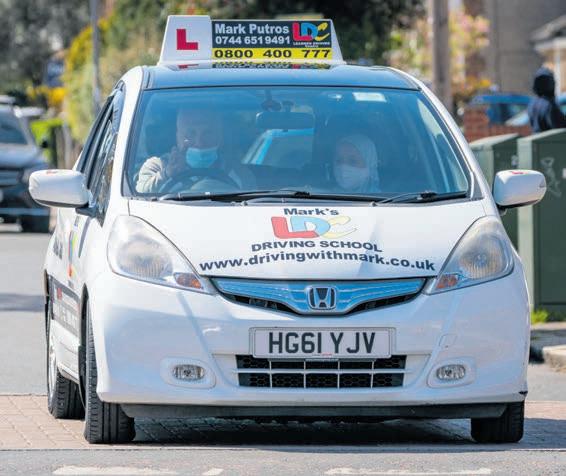
DRIVE MY CAR Young drivers say they can’t book tests because of bots
Tim Pitt drives a small-scale tribute to 007’s famous Aston Martin DB5, complete with machine guns and a smoke screen.
SEANConnery and Roger Moore hold the joint-record for playing James Bond, with seven films apiece. Yet both are trumped by the Aston Martin DB5, which has nine movies to its name. Indeed, 007’s DB5 is up there with Herbie and the DeLorean Time Machine as perhaps the most famous four-wheeled film star of all.
Aston Martin recently built a run of 25 DB5 Goldfinger tribute cars, each priced at a cool £3.3 million. By comparison, the £108,000 asked for this two-thirds-scale DB5 Junior No Time To Die edition is almost pocket change –and it too comes with an arsenal of Q Branch gadgets, including pop-out machine guns and a smoke screen.
The DB5 Junior is hand-built at Bicester Heritage – a former RAF base in Oxfordshire – by The Little Car Company. “We get slightly offended when
people describe our vehicles as toys,” says CEO Ben Hedley. “These are properly engineered little cars.” The range also includes a Bugatti Type 35 and Ferrari Testa Rossa, with a scaled-up, road-legal version of the Tamiya Wild One RC car due this summer.
Beneath its carbon fibre body, the downsized DB5 hides an aluminium honeycomb chassis and four 1.8kWh electric motors: good for 22hp and a top speed of 45mph. Suspension geometry is based on the Aston Martin original, while brakes are drilled discs with callipers from a Ducati superbike. Officially, the car is designed for drivers aged 14 or older, but a learner mode limits it to 12mph and a range of 50 metres from the (slightly panicked) parent with the key fob.
Inside, Smiths gauges and Connolly leather add a touch of authentic Aston Martin, while a hidden panel beside
ASTON MARTIN DB5 JUNIOR NTTD
PRICE: £108,000
POWER: 22HP
TOP SPEED: 45MPH
BATTERIES: 4 X 1.8KWH
ELECTRIC RANGE: 60 MILES
PRODUCTION: 125 CARS
the dashboard reveals some decidedly non-standard switches. I can almost hear Q’s voice in my head: “Need I remind you, 007, that you have a licence to kill, not to break the traffic laws”. I try out the guns first (admit it, you would too). Hold down a button and the headlamps retract – “a fiendishly difficult piece of engineering,” says Hedley – then two rotating mini guns emerge with a rat-a-tat soundtrack. If your enemy is in pursuit, another but-
ton releases a steady stream of smoke from the exhaust tailpipes. It’s the same dense, non-toxic gas used by cash collection vans in case of a robbery.
When the DB5 debuted in Goldfinger (1964), it had rotating number plates. For its most recent appearance in No Time To Die (2021), these were upgraded to switchable digital plates –as seen here. “Chris Corbould, the special effects expert on the Bond films, actually shared the software with us,” Hedley explains.
The final hidden gadget is a skid mode, which locks the front wheels to allow tyre-smoking getaways. However, I’ll need to visit Bicester’s onsite airfield to sample that. I grasp the wooden steering wheel, check the bullet-shaped mirrors, then glide away in effortless electric silence. All I need now is Xenia Onatopp in the passenger seat. Some chance.
Like any EV, the DB5 Junior is simple to drive, with two pedals and no gears to worry about. Its handling was tuned to emulate a modern Aston Martin Vantage, so it isn’t as taut and one-dimensional as a go-kart; there’s a progressiveness and real sense of sophistication here. Don’t worry, though, this Aston Martin also needs little encouragement to go excitably, hilariously sideways. Acceleration is punchy and the 45mph maximum feels seriously swift when your backside is millimetres from the concrete.


The No Time To Die DB5 is impossible to justify on any rational level, yet equally impossible not to love. All I need now is the six-figure asking price and a big patch of land to drive it on. Know anyone with a hollowed-out volcano?
Tim Pitt writes for motoringresearch.com
SO, WHATwill 007 drive when he next screeches onto our screens?
The next instalment of the James Bond franchise isn't due until 2025, but don't be surprised if MI6's finest rocks up in this: a new Aston Martin DB12.
No doubt, the DB12 looks the part –and it could also lay waste to a few trigger-happy henchmen on perilous mountain roads. We'll be driving it later this month (on perilous mountain roads, no less). Until then, here is what you need to know.
The heart of the DB12 is a reworked version of Aston Martin's proven 4.0litre twin-turbo V8. With 680hp and a dry weight of 1,685kg, it’s good for
0-62mph in 3.6 seconds and 202mph flat-out. Power goes to the rear wheels via an eight-speed automatic transmission.
The default GT drive mode is said to offer 'a luxurious ride quality... for sublime yet agile cruising'. Switching to Sport or Sport+ ramps up the intensity, plus there's a new Wet mode tailor-made for British weather.
Aston Martin promises 'the sharpest DB ever'. The car's bonded aluminium structure is seven percent stiffer than a DB11 and its non-isolated steering column should offer improved feedback.

Aston Martin has developed its


own in-house infotainment for the DB12, with two 10.25-inch screens, 3D navigation, online connectivity and a dedicated smartphone app. The driver and front passenger are cocooned by a high centre console with a mixture of analogue switches and digital controls. Buyers can choose from endless options via the company’s 'Q' personalisation division, too.
The handsome DB12 is clearly part of a bloodline that began with the DB7 in 1994, yet its taut contours and athletic stance are more Daniel Craig than Pierce Brosnan. Let’s hope the driving experience lives up to the looks.
For over two decades James May’s reputation as ‘the nice one’ on Top Gear, and more recently The Grand Tour opposite Jeremy Clarkson and Richard Hammond, has made him one of British TV’s most successful exports. Their everything’s-a-joke style has been controversial – the trio have been called out for gags deemed homophobic and racially insensitive – but the viewing figures suggest audiences still want more.
Since Clarkson’s controversial Top Gear sacking in 2015 for punching a producer, The Grand Tour has become one of Amazon Original’s best performing series. The trio carried over their successful style, with May donning a fake moustache to play a gun-wielding sheriff in a detective skit for the show launch. On his other Amazon Original series, Our Man In Italy, May wears a furry monster suit and ghoulish mask to participate in a local cultural ceremony. “James May loves dressing up,” an official YouTube video is captioned. When we speak, May has just turned 60, a birthday he “didn’t make much of.” Nevertheless, he feels a period of change is afoot, both for himself and for Clarkson and Hammond as all three arrive in their Bus Pass Era.

“I don't think people particularly like watching that,” he says of incidents such as when Clarkson and Hammond wore burkas in a Top Gear episode.
“They’d rather see me nerd out on something I genuinely like, making a violin or some mosaics. There's no point trying to make me play canoe polo. I’m a stiff old man, I can’t compete with 18year-old girls who are athletes,” he says, pausing. “Plus it looks a bit pervy.”
Doesn’t 60 feel young these days? “No, I don't think it does. You never think you'll be old. It's as absurd as going to live in space. So I suppose it came as a bit of a shock. We're really baggy now. I suppose what it means is that we've always known that we can't do it forever, but now we actually have to accept that
we're much nearer to the end than the beginning.”
We are speaking in his publicist’s office in central London, where he's promoting a new feature-length episode of The Grand Tour. It's called Eurocrash and will be released on 10 June on Amazon. In person, May is exactly like he is on TV, and after a day of Zooms, is thankful that I'm asking questions faceto-face. He's so enamoured by the bowl of M&Ms in front of him that during one pause in conversation, he scoops up a handful so big that some don’t make it to his mouth, falling on the table. “Sorry. You can have some if you want.” There are chocolate biscuits too – “I brought these in” – neatly arranged into circles.
In fairness, he does love food: another Amazon Original, James May: Oh Cook!, is a sensible approximation of what a post-60 James May might look like. In it, May mostly finds excuses to drink wine and point out how he doesn’t know

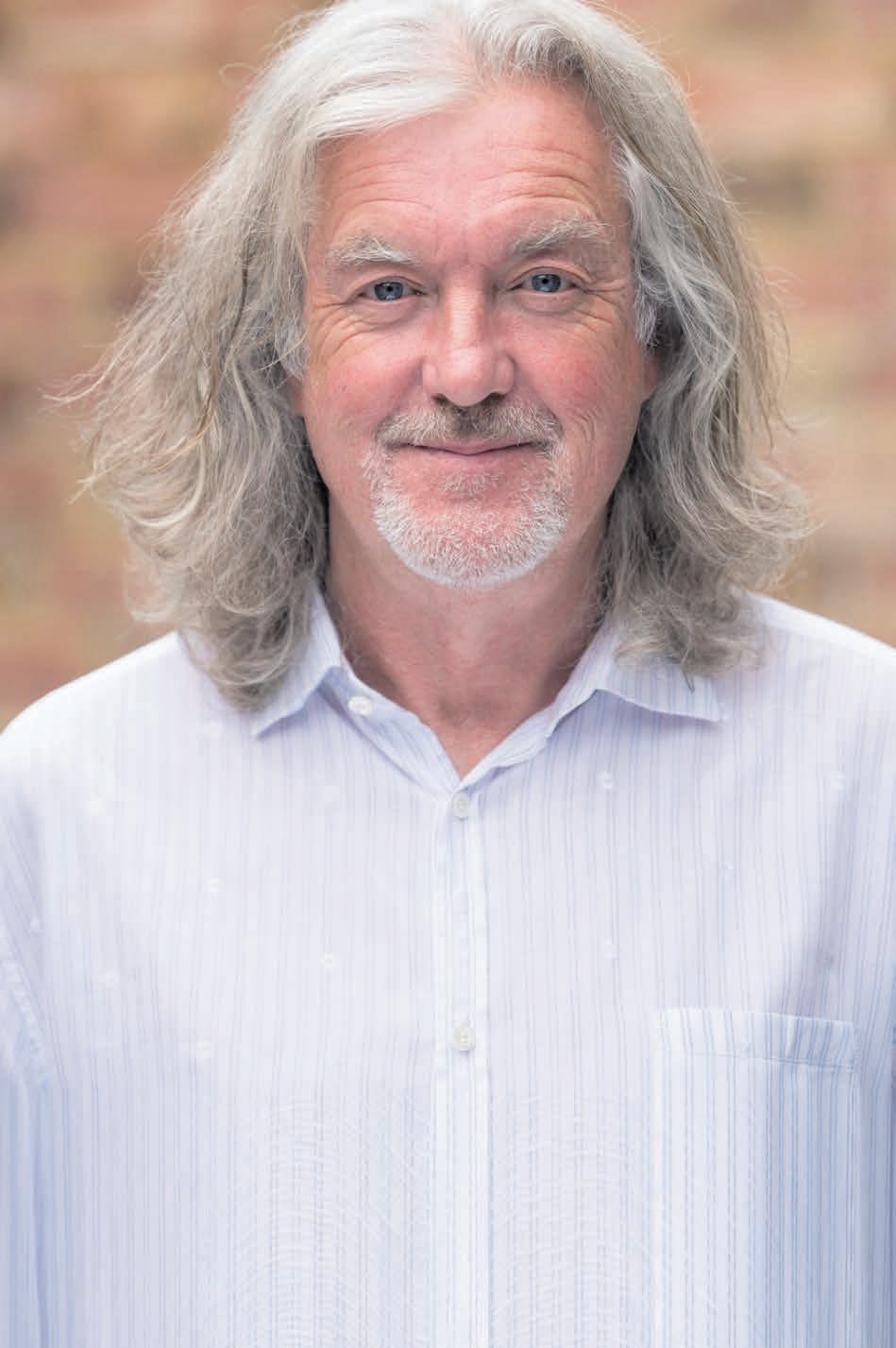
He's one third of the controversial team behind The Grand Tour and Top Gear. Adam Bloodworth speaks to James May about being woke, Freddie Flintoff's accident and working with Jeremy Clarkson

much about cooking. You feel May genuinely enjoys it.
It’s not all maturity, however. In Eurocrash the trio road trip from Poland to Slovenia; May chooses a 75-year-old, four-metre-long vintage Crosley convertible, an impractical car to drive for weeks on end given it can barely reach 40 mph with its 724cc engine. The car is literally picked up and shifted half its width sideways on motorways by the force created by lorries whooshing past. “I hated it. It was horrific." He says of The Grand Tour stunts: "I didn't enjoy any of it, if I'm honest. It makes great TV but it wasn't pleasurable.”
Driving a car that slow on UK roads would be illegal due to the minimum
speed limit, but on the mainland “it’s not illegal it’s just stupid. I wouldn’t want to crash in it. There’s no airbags. There’s nothing. It’s very light and very narrow so it’s not stable. It was like being on a bicycle when a lorry does a close pass. I didn't like that at all. I was going for miles and miles like that.”
May and co don’t have producer credits on The Grand Tour but are heavily involved in coming up with the stunts and storylines, alongside longtime producer Andy Wilman. They discuss ideas “in the pub,” says May. Once the trio went to Clarkson’s farm to hash out ideas. “We might have a beer, we talk about it over suppers. It’s a fairly rolling, ongoing process. You can’t say
carefully and then at the weekends go racing. We are sort of very broadly what you see on the telly. We’re shit actors anyway, we couldn’t do it any other way.”
How about coming up with the unwoke jokes? “I did once say that I’m more woke than the other two, but I think I got misquoted," says May. "What I was really saying was that they’re very unwoke.” Having said that, May isn't necessarily woke by today’s standards: I ask if he regrets Top Gear’s homophobic humour, when Clarkson would say certain cars were for homosexuals for in-
stance, and he seems legitimately oblivious to why that might be seen as offensive: “Did we make jokes about homosexuality?” he asks. "We have been going 20 years. A long time in the history of societal attitudes..."
Which leads us onto the show he’ll always be remembered for. Following Freddie Flintoff’s horrific accident, in which he crashed a jet-powered dragster while travelling at 288mph, could this finally be the end of the BBC show? May hopes not.
"Maybe it'll be another enforced reinvention of Top Gear. It happens now
‘right, we’re going to come up with an idea.’ It doesn’t work like that. They sort of emerge.’”
So what’s it actually like working with Clarkson and Hammond? “If we’d been at Six Form College together, I don’t think we would’ve been in the same gang, we’re too different. But that’s part of the chemistry. We’re not so different that we’re a mystery to one another but we’re different enough to come up with an acceptably different take on any aspect of it. We are cartoon versions of ourselves, exaggerations, but they’re rooted in certain amounts of truth. It’s not as if Jeremy goes around being bombastic and goes home and writes sonnets; he doesn’t. And I don’t drive very
and then, and it's no bad thing. That's a big, difficult question for the BBC. The Freddie Flintoff thing is deeply unfortunate. It's obviously a bit more serious than we first thought, it's not just a bit of a shunt, he's badly hurt. Whether or not it'll keep going, I don't know. I'd love to see it continue. It's been going for a very long time. I watched it as a kid so I wouldn't want it to disappear.”
Odds are it'll still be going, in some form or other, when Clarkson, May and Hammond are happily tending to their respective vegetable patches. “When we first started doing Top Gear back in 2003 I thought, ‘Oh, this is a good laugh. And if we're lucky, it might last for a few years. And here we are, 20 years later, and people don't seem to have got sick of us. Or maybe they have and you're not telling?”
The new series of The Grand Tour starts on Amazon Prime on 10 June
There's no point trying to make me play canoe polo. I’m a stiff old man, I can’t compete with 18-year-old girls who are athletes. Plus it looks a bit pervy.
You never think you'll be old. It's as absurd as going to live in space. So I suppose it came as a bit of a shock.
IT’S BEEN 16 months since Russian president Vladimir Putin illegally invaded Ukraine – supported by Belarus – and nine years since the occupation of the Crimea.
But today, over 1,200 miles away from Kiev in the suburbs of Paris, is set to see the most notable meeting since the 2022 war began between players who represent the two sides of the conflict.
The women’s French Open quarterfinal between No2 seed Belarusian Aryna Sabalenka and unseeded Ukrainian Elina Svitolina is scheduled for Roland Garros this morning.
Tennis has been at the forefront of simmering tensions over Russia’s aggression, which has seen players refuse to shake hands and express political messages. But none of these have come at the business end of a Grand Slam.
Those who say sport isn’t political aren’t being truthful. Countries and regimes use sporting success as a diplo-
OPINION
Trevor Steven
THIS week’s Europa Conference League final could prove to be a pivotal moment for West Ham United and David Moyes.
Merely reaching a match of this size means that West Ham’s name will travel around the world over the next few days, but lifting a first trophy of note since 1981 it can catapult the club to the next level.
But it almost feels as if they have to win it, because defeat to Fiorentina in Prague on Wednesday would end the season on a real downer and could plunge them into a spiral of negativity that costs Moyes his job.


I feel that Moyes deserves great credit for showing that there is life yet in some of the old British managers after his position came under pressure earlier in the season.
It would have been easy to cast him aside and seek the next bright young thing but the West Ham board stuck with him and it has proven to be an inspired move.
He insisted that he never felt that his job was under threat but the Hammers’ slide down the Premier League table was always going to be hard to take for supporters.
The players deserve praise too for turning the campaign around, because the squad is not big or deep enough to rotate and rest many players.
It’s worth remembering that Moyes oversaw two very good seasons at the London Stadium, finishing sixth and seventh in the Premier League, before this one.
That has been undermined this term by a struggle to match those results domestically, but it is the hardest league in the world and they have paid for a lack of depth.
That should be no surprise – it would have been a minor miracle to keep that run going seamlessly – and while they did spend money last summer, it wasn’t extravagant and those players needed time to acclimatise to English football.
Throw in the disruption of a winter World Cup and West Ham have had plenty to contend with in 2022-23.
matic tool, parading their heroes as a metaphor for their strength. Russia has done this for decades.
But Belarus, under Alexander Lukashenko, is a country widely seen by many as a puppet state of Russia and the Kremlin, despite recently being a member of the Eastern Partnership.
Along with Russians, Belarusians were last year banned from competing at Wimbledon and other British tournaments by the All England Club and the Lawn Tennis Association following pressure from the UK Government. But that has had little impact on the tennis season, besides the lack of ranking points available at the London slam.
On her way to the quarter finals in Paris, Sabalenka has seen off Ukrainian
Marta Kostyuk, Belarusian Iryna Shymanovich, Russian Kamilla Rakhimova and American Sloane Stephens. Svitolina, meanwhile, beat Italian Martina Trevisan and Australian Storm Hunter before facing Russians Anna Blinkova and Daria Kasatkina.

The Ukrainian has been taking the moral high ground at Roland Garros, where crowds often boo players.
TAKING A BRAVE STAND
Svitolina had said she would not shake hands with any Russian or Belarusian player during Roland Garros due to the illegal war in Eastern Europe; she kept her word against Kasatkina, albeit still acknowledging her after victory. Fans still booed the Russian off the court.
She also called her Russian last 16 opponent “brave” for taking a sympathetic stance on Ukranians who refuse to shake hands.
“[I am] really thankful for her position that she took. She’s [a] really brave person to say it publicly, that not so many players did,” Svitolina said, after advancing to the last eight.
“She’s a brave one.”
“The saddest part is the war still going on,” the defeated Kasatkina, an out-
The Europa Conference League may be mocked by some football fans but getting to any final shows stamina and resolve, especially amid the ups and downs of a domestic season.
West Ham have come through 14 matches on the way to Prague, each one a challenge – from the artificial pitch at Silkeborg to tough ties against Gent and AZ Alkmaar.
They have won 13 of those and stayed unbeaten. Now they have one more to go, and you have to stand back and applaud Moyes for that.
He has helped foster the team spirit that has carried them through the

more difficult moments by protecting players when they have come under fire.
I also think that the Europa Conference League run contributed to their late-season resurgence in the Premier League.
The final is a legacy moment for Moyes. Win it, and he can design and execute a two-year plan with the promise of Europa League football.
Declan Rice might be leaving this summer, but West Ham have finally settled into the London Stadium and
spoken advocate on Ukraine, gender equality and on gay rights, as a member of the LGBTQ+ community, said last month.
“So of course, players from Ukraine have got a lot of reasons to not shake our hands. I accept it and it is how it is. It’s a very sad situation and I understand.”
Belarusian Sabalenka is the overwhelming favourite for this last eight tie at Roland Garros, though many will also be monitoring Carlos Acaraz and Novak Djokovic’s quarter-finals on the clay. Sport is political, and there’s no getting away from it. But with a remote acknowledgement from either side of the net likely, Sabalenka and Svitolina can ensure the tennis at least attempts to be the centre of attention.
they have lots of things going for them.
I hope they do it, and even if they don’t I think Moyes has done enough since returning to the club to deserve to see out the final year of his current contract.
Sacking him would be a knee-jerk reaction, but I do think that the club may find it hard to resist calls from fans and the media to call time.
Trevor Steven is a former England footballer who played at two World Cups and two European Championships. @TrevorSteven63.
Sacking Moyes would be a kneejerk reaction, but I do think the club may find it hard to resist callsSvitolina aims to upset Sabalenka today
Trevor Steven on the match that could decide Moyes’ future


FRANK DALLERES
CHARLTON Athletic’s owner has agreed to sell the club to the USbankrolled SE7 Partners consortium fronted by former Sunderland director Charlie Methven.
The third-tier team confirmed on Monday that a deal had been struck between current owner Thomas Sandgaard and SE7 Partners, which also includes former Charlton finance director Ed Warrick and US billionaire Joshua Friedman.
Charlton chief executive Peter Storrie said: “A deal has been agreed and a share purchase agreement has been signed by Thomas Sandgaard and SE7 Partners.
“We’ll now work with SE7 Partners and the EFL [English Football League] to meet the league requirements, which is a process that can take some time.
TREBLE-CHASINGManchester City have added another title –the world’s most valuable football club brand. City have received the accolade from leading brand consultancy Brand Finance, whose annual Football 50 list is published today.


The Abu Dhabi-owned club have overtaken Real Madrid at the top of the rankings for the first time following their sustained on-field success. City, who on Saturday added the FA Cup to their Premier League title, have seen their brand value grow by 16 per cent to £1.299bn.
The Blues, who face Inter Milan in this weekend’s Champions League final, have the highest revenue of all clubs in the top 50. That has been driven by prize money and TV payments from European chiefs Uefa and the Premier League, as well as lucrative sponsorship deals with Etihad and Puma. Some of
12MAN CITYENGLAND£1,299M+15.45%
21REAL MADRIDSPAIN£1,258M-2.7%
33BARCELONASPAIN£1,185M+5.55%
45MAN UTDENGLAND£1,174M+10.7%
54LIVERPOOL FCENGLAND£1,173M+8.8%
those commercial contracts remain the subject of a dispute with the Premier League, for which they received 115 charges of rule breaches. City are contesting the claims.
“Manchester City FC has achieved an extraordinary feat by surpassing Real Madrid to become the champion of


football club brands,” said Hugo Hensley, Head of Sports Services at Brand Finance. “The club’s performance in this year’s ranking highlights that Manchester City are performing off the pitch in terms of building a strong brand and attracting fans and sponsors.”
Real Madrid have seen their brand value
fall three per cent to £1.258bn after failing to retain the Champions League or win Spain’s LaLiga. Rivals Barcelona are placed third, with Manchester United overtaking Liverpool for fourth place in Brand Finance’s list.
United’s brand value is up 11 per cent to £1.174bn thanks to an on-field resurgence and the resilience of their global appeal. Liverpool’s failure to finish in the domestic top four or go deep in European competition has seen them slip one place despite brand value growing nine per cent to £1.173bn.
Arsenal posted the biggest increase in brand value among the top 10 to jump Tottenham Hotspur and Chelsea into eighth position. The Gunners have seen their brand value grow 16 per cent to £782m as they enjoyed their best Premier League season for seven years.
West Ham United, who have reached this week’s Europa Conference League final, are 16th after their grand value grew seven per cent to £266m.
“In the meantime, the day-to-day running of the club will not be impacted. Our preparation and recruitment for the 2023/24 season is well under way.
“We have our targets for our men’s team and our women’s team. Led by Dean Holden and Karen Hills, those plans continue to progress and will not be halted while we await the approval.
“The aim is to put the club in the best position to achieve our targets for next season – a top-six finish for the men’s team and further progression for the women’s team.”
The deal comes four months after takeover talks between SE7 Partners and Sandgaard collapsed amid reports that the Dane had changed his demands. SE7’s agreement does not include Charlton’s stadium, The Valley, and training ground, which belong to the club’s former owner Roland Duchatelet.
Former journalist Methven was executive director at Sunderland for 18 months until late 2019 and remained a minority owner until last summer.
MATT HARDY
IGA Swiatek will play a repeat of last year’s French Open final this week with her win yesterday against Lesia Tsurenko earning her a quarterfinal tie against Coco Gauff.
The world No1 from Poland beat her Ukrainian opponent in the fourth round of the French Open after Tsurenko retired while Gauff toppled Anna Schmiedlova 7-5 6-2.

The two winners met in the final at Roland Garros in 2022 with Swiatek winning 6-1 6-3 on Court Philippe Chatrier.
Elsewhere in the Parisian suburbs, 2022 Wimbledon and US Open
finalist Ons Jabeur breezed past Bernarda Pera 6-3 6-1 while there were wins for Casper Ruud, Holger Rune and Beatriz Haddad Maia –Rune overcame Argentinian Francisco Cerundolo in a fiveset thriller.
Novak Djokovic and Carlos Alcaraz both feature today.
Andy Murray, meanwhile, began his run towards a third Wimbledon title with a 6-3 6-2 win over South Korean Chung Hyeon.
Fellow Brit Ryan Peniston also got off to a winning start at the Surbiton Trophy event with a 6-4 6-2 victory over Jiri Vesely.
FRANK DALLERES
FINANCIALservices provider Apex Group has agreed a three-year sponsorship deal with SailGP believed to be worth in excess of $1m, City A.M. can reveal.
The deal, to be announced today, will see Apex become the exclusive financial solutions partner for SailGP.
The sailing competition is backed by tech tycoon Larry Ellison and features teams including Ben Ainslie’s Emirates Great Britain outfit.
The tie-up will also see Apex Group bring its Women’s Accelerator programme into sport in order to drive female progression in a traditionally
male-dominated environment.
Apex Group founder Peter Hughes said: “I’m really excited about our partnership with SailGP, a partner that is truly aligned with our own commitments to innovation, sustainability and women’s empowerment.
“We have been disrupting our industry with a new era of service through driving positive change initiatives –similarly SailGP is at the forefront of innovating for one of the most sustainable sports in the world and that’s a key reason for our collaboration.”
It represents the biggest investment yet in sport by Apex, which previously signed a sponsorship deal with West Indies Cricket in 2021.
Swiatek sets up repeat of last year’s slam final with win